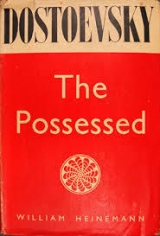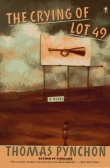
Текст книги "The Possessed"
Автор книги: Федор Достоевский
сообщить о нарушении
Текущая страница: 2 (всего у книги 49 страниц)
V
She had herself designed the costume for him which he wore for the rest of his life. It was elegant and characteristic; a long black frock-coat, buttoned almost to the top, but stylishly cut; a soft hat (in summer a straw hat) with a wide brim, a white batiste cravat with a full bow and hanging ends, a cane with a silver knob; his hair flowed on to his shoulders. It was dark brown, and only lately had begun to get a little grey. He was clean-shaven. He was said to have been very handsome in his youth. And, to my mind, he was still an exceptionally impressive figure even in old age. Besides, who can talk of old age at fifty-three? From his special pose as a patriot, however, he did not try to appear younger, but seemed rather to pride himself on the solidity of his age, and, dressed as described, tall and thin with flowing hair, he looked almost like a patriarch, or even more like the portrait of the poet Kukolnik, engraved in the edition of his works published in 1830 or thereabouts. This resemblance was especially striking when he sat in the garden in summertime, on a seat under a bush of flowering lilac, with both hands propped on his cane and an open book beside him, musing poetically over the setting sun. In regard to books I may remark that he came in later years rather to avoid reading. But that was only quite towards the end. The papers and magazines ordered in great profusion by Varvara Petrovna he was continually reading. He never lost interest in the successes of Russian literature either, though he always maintained a dignified attitude with regard to them. He was at one time engrossed in the study of our home and foreign politics, but he soon gave up the undertaking with a gesture of despair. It sometimes happened that he would take De Tocqueville with him into the garden while he had a Paul de Kock in his pocket. But these are trivial matters.
I must observe in parenthesis about the portrait of Kukolnik; the engraving had first come into the hands of Varvara Petrovna when she was a girl in a high-class boarding-school in Moscow. She fell in love with the portrait at once, after the habit of all girls at school who fall in love with anything they come across, as well as with their teachers, especially the drawing and writing masters. What is interesting in this, though, is not the characteristics of girls but the fact that even at fifty Varvara Petrovna kept the engraving among her most intimate and treasured possessions, so that perhaps it was only on this account that she had designed for Stepan Trofimovitch a costume somewhat like the poet's in the engraving. But that, of course, is a trifling matter too.
For the first years or, more accurately, for the first half of the time he spent with Varvara Petrovna, Stepan Trofimovitch was still planning a book and every day seriously prepared to write it. But during the later period he must have forgotten even what he had done. More and more frequently he used to say to us:
“I seem to be ready for work, my materials are collected, yet the work doesn't get done! Nothing is done!”
And he would bow his head dejectedly. No doubt this was calculated to increase his prestige in our eyes as a martyr to science, but. he himself was longing for something else. “They have forgotten me! I'm no use to anyone!” broke from him more than once. This intensified depression took special hold of him towards the end of the fifties. Varvara Petrovna realised at last that it was a serious matter. Besides, she could not endure the idea that her friend was forgotten and useless. To distract him and at the same time to renew his fame she carried him off to Moscow, where she had fashionable acquaintances in the literary and scientific world; but it appeared that Moscow too was unsatisfactory.
It was a peculiar time; something new was beginning, quite unlike the stagnation of the past, something very strange too, though it was felt everywhere, even at Skvoreshniki. Rumours of all sorts reached us. The facts were generally more or less well known, but it was evident that in addition to the facts there were certain ideas accompanying them, and what's more, a great number of them. And this was perplexing. It was impossible to estimate and find out exactly what was the drift of these ideas. Varvara Petrovna was prompted by the feminine composition of her character to a compelling desire to penetrate the secret of them. She took to reading newspapers and magazines, prohibited publications printed abroad and even the revolutionary manifestoes which were just beginning to appear at the time (she was able to procure them all); but this only set her head in a whirl. She fell to writing letters; she got few answers, and they grew more incomprehensible as time went on. Stepan Trofimovitch was solemnly called upon to explain “these ideas” to her once for all, but she remained distinctly dissatisfied with his explanations.
Stepan Trofimovitch's view of the general movement was supercilious in the extreme. In his eyes all it amounted to was that he was forgotten and of no use. At last his name was mentioned, at first in periodicals published abroad as that of an exiled martyr, and immediately afterwards in Petersburg as that of a former star in a celebrated constellation. He was even for some reason compared with Radishtchev. Then some one printed the statement that he was dead and promised an obituary notice of him. Stepan Trofimovitch instantly perked up and assumed an air of immense dignity. All his disdain for his contemporaries evaporated and he began to cherish the dream of joining the movement and showing his powers. Varvara Petrovna's faith in everything instantly revived and she was thrown into a violent ferment. It was decided to go to Petersburg without a moment's delay, to find out everything on the spot, to go into everything personally, and, if possible, to throw themselves heart and soul into the new movement. Among other things she announced that she was prepared to found a magazine of her own, and henceforward to devote her whole life to it. Seeing what it had come to, Stepan Trofimovitch became more condescending than ever, and on the journey began to behave almost patronisingly to Varvara Petrovna – which she at once laid up in her heart against him. She had, however, another very important reason for the trip, which was to renew her connections in higher spheres. It was necessary, as far as she could, to remind the world of her existence, or at any rate to make an attempt to do so. The ostensible object of the journey was to see her only son, who was just finishing his studies at a Petersburg lyceum.
VI
They spent almost the whole winter season in Petersburg. But by Lent everything burst like a rainbow-coloured soap-bubble.
Their dreams were dissipated, and the muddle, far from being cleared up, had become even more revoltingly incomprehensible. To begin with, connections with the higher spheres were not established, or only on a microscopic scale, and by humiliating exertions. In her mortification Varvara Petrovna threw herself heart and soul into the “new ideas,” and began giving evening receptions. She invited literary people, and they were brought to her at once in multitudes. Afterwards they came of themselves without invitation, one brought another. Never had she seen such literary men. They were incredibly vain, but quite open in their vanity, as though they were performing a duty by the display of it. Some (but by no means all) of them even turned up intoxicated, seeming, however, to detect in this a peculiar, only recently discovered, merit. They were all strangely proud of something. On every face was written that they had only just discovered some extremely important secret. They abused one another, and took credit to themselves for it. It was rather difficult to find out what they had written exactly, but among them there were critics, novelists, dramatists, satirists, and exposers of abuses. Stepan Trofimovitch penetrated into their very highest circle from which the movement was directed. Incredible heights had to be scaled to reach this group; but they gave him a cordial welcome, though, of course, no one of them had ever heard of him or knew anything about him except that he “represented an idea.” His manoeuvres among them were so successful that he got them twice to Varvara Petrovna's salon in spite of their Olympian grandeur. These people were very serious and very polite; they behaved nicely; the others were evidently afraid of them; but it was obvious that they had no time to spare. Two or three former literary celebrities who happened to be in Petersburg, and with whom Varvara Petrovna had long maintained a most refined correspondence, came also. But to her surprise these genuine and quite indubitable celebrities were stiller than water, humbler than the grass, and some of them simply hung on to this new rabble, and were shamefully cringing before them. At first Stepan Trofimovitch was a success. People caught at him and began to exhibit him at public literary gatherings. The first time he came on to the platform at some public reading in which he was to take part, he was received with enthusiastic clapping which lasted for five minutes. He recalled this with tears nine years afterwards, though rather from his natural artistic sensibility than from gratitude. “I swear, and I'm ready to bet,” he declared (but only to me, and in secret), “that not one of that audience knew anything whatever about me.” A noteworthy admission. He must have had a keen intelligence since he was capable of grasping his position so clearly even on the platform, even in such a state of exaltation; it also follows that he had not a keen intelligence if, nine years afterwards, he could not recall it without mortification, he was made to sign two or three collective protests (against what he did not know); he signed them. Varvara Petrovna too was made to protest against some “disgraceful action” and she signed too. The majority of these new people, however, though they visited Varvara Petrovna, felt themselves for some reason called upon to regard her with contempt, and with undisguised irony. Stepan Trofimovitch hinted to me at bitter moments afterwards that it was from that time she had been envious of him. She saw, of course, that she could not get on with these people, yet she received them eagerly, with all the hysterical impatience of her sex, and, what is more, she expected something. At her parties she talked little, although she could talk, but she listened the more. They talked of the abolition of the censorship, and of phonetic spelling, of the substitution of the Latin characters for the Russian alphabet, of some one's having been sent into exile the day before, of some scandal, of the advantage of splitting Russia into nationalities united in a free federation, of the abolition of the army and the navy, of the restoration of Poland as far as the Dnieper, of the peasant reforms, and of the manifestoes, of the abolition of the hereditary principle, of the family, of children, and of priests, of women's rights, of Kraevsky's house, for which no one ever seemed able to forgive Mr. Kraevsky, and so on, and so on. It was evident that in this mob of new people there were many impostors, but undoubtedly there were also many honest and very attractive people, in spite of some surprising characteristics in them. The honest ones were far more difficult to understand than the coarse and dishonest, but it was impossible to tell which was being made a tool of by the other. When Varvara Petrovna announced her idea of founding a magazine, people flocked to her in even larger numbers, but charges of being a capitalist and an exploiter of labour were showered upon her to her face. The rudeness of these accusations was only equalled by their unexpectedness. The aged General Ivan Ivanovitch Drozdov, an old friend and comrade of the late General Stavrogin's, known to us all here as an extremely stubborn and irritable, though very estimable, man (in his own way, of course), who ate a great deal, and was dreadfully afraid of atheism, quarrelled at one of Varvara Petrovna's parties with a distinguished young man. The latter at the first word exclaimed, “You must be a general if you talk like that,” meaning that he could find no word of abuse worse than “general.”
Ivan Ivanovitch flew into a terrible passion: “Yes, sir, I am a general, and a lieutenant-general, and I have served my Tsar, and you, sir, are a puppy and an infidel!”
An outrageous scene followed. Next day the incident was exposed in print, and they began getting up a collective protest against Varvara Petrovna's disgraceful conduct in not having immediately turned the general out. In an illustrated paper there appeared a malignant caricature in which Varvara Petrovna, Stepan Trofimovitch, and General Drozdov were depicted as three reactionary friends. There were verses attached to this caricature written by a popular poet especially for the occasion. I may observe, for my own part, that many persons of general's rank certainly have an absurd habit of saying, “I have served my Tsar “... just as though they had not the same Tsar as all the rest of us, their simple fellow-subjects, but had a special Tsar of their own.
It was impossible, of course, to remain any longer in Petersburg, all the more so as Stepan Trofimovitch was overtaken by a complete fiasco. He could not resist talking of the claims of art, and they laughed at him more loudly as time went on. At his last lecture he thought to impress them with patriotic eloquence, hoping to touch their hearts, and reckoning on the respect inspired by his “persecution.” He did not attempt to dispute the uselessness and absurdity of the word “fatherland,” acknowledged the pernicious influence of religion, but firmly and loudly declared that boots were of less consequence than Pushkin; of much less, indeed. He was hissed so mercilessly that he burst into tears, there and then, on the platform. Varvara Petrovna took him home more dead than alive. “ On m'a traits, comme un vieux bonnet de coton,” he babbled senselessly. She was looking after him all night, giving him laurel-drops and repeating to him till daybreak, “You will still be of use; you will still make your mark; you will be appreciated ... in another place.”
Early next morning five literary men called on Varvara Petrovna, three of them complete strangers, whom she had ever set eyes on before. With a stern air they informed her that they had looked into the question of her magazine, and had brought her their decision on the subject. Varvara Petrovna had never authorised anyone to look into or decide anything concerning her magazine. Their decision was that, having founded the magazine, she should at once hand it over to them with the capital to run it, on the basis of a co-operative society. She herself was to go back to Skvoreshniki, not forgetting to take with her Stepan Trofimovitch, who was “out of date.” From delicacy they agreed to recognise the right of property in her case, and to send her every year a sixth part of the net profits. What was most touching about it was that of these five men, four certainly were not actuated by any mercenary motive, and were simply acting in the interests of the “cause.”
“We came away utterly at a loss,” Stepan Trofimovitch used to say afterwards. “I couldn't make head or tail of it, and kept muttering, I remember, to the rumble of the train:
'Vyek , and vyek, and Lyov Kambek, Lyov Kambek and vyek, and vyek.'
and goodness knows what, all the way to Moscow. It was only in Moscow that I came to myself – as though we really might find something different there.”
“Oh, my friends!” he would exclaim to us sometimes with fervour, '' you cannot imagine what wrath and sadness overcome your whole soul when a great idea, which you have long cherished as holy, is caught up by the ignorant and dragged forth before fools like themselves into the street, and you suddenly meet it in the market unrecognisable, in the mud, absurdly set up, without proportion, without harmony, the plaything of foolish louts! No! In our day it was not so, and it was not this for which we strove. No, no, not this at all. I don't recognise it. ... Our day will come again and will turn all the tottering fabric of to-day into a true path. If not, what will happen? . . .”
VII
Immediately on their return from Petersburg Varvara Petrovna sent her friend abroad to “recruit”; and, indeed, it was necessary for them to part for a time, she felt that. Stepan Trofimovitch was delighted to go.
“There I shall revive!” he exclaimed. “There, at last, I shall set to work!” But in the first of his letters from Berlin he struck his usual note:
“My heart is broken!” he wrote to Varvara Petrovna. “I can forget nothing! Here, in Berlin, everything brings back to me my old past, my first raptures and my first agonies. Where is she? Where are they both? Where are you two angels of whom I was never worthy? Where is my son, my beloved son? And last of all, where am I,where is my old self, strong as steel. firm as a rock, when now some Andreev, our orthodox clown with a beard, pent briser man existence en deux”—and so on.
As for Stepan Trofimovitch's son, he had only seen him twice in his life, the first time when he was born and the second time lately in Petersburg, where the young man was preparing to enter the university. The boy had been all his life, as we have said already, brought up by his aunts (at Varvara Petrovna's expense) in a remote province, nearly six hundred miles from Skvoreshniki. As for Andreev, he was nothing more or less than our local shopkeeper, a very eccentric fellow, a self-taught archaeologist who had a passion for collecting Russian antiquities and sometimes tried to outshine Stepan Trofimovitch in erudition and in the progressiveness of his opinions. This worthy shopkeeper, with a grey beard and silver-rimmed spectacles, still owed Stepan Trofimovitch four hundred roubles for some acres of timber he had bought on the latter's little estate (near Skvoreshniki). Though Varvara Petrovna had liberally provided her friend with funds when she sent him to Berlin, yet Stepan Trofimovitch had, before starting, particularly reckoned on getting that four hundred roubles, probably for his secret expenditure, and was ready to cry when Andreev asked leave to defer payment for a month, which he had a right to do, since he had brought the first installments of the money almost six months in advance to meet Stepan Trofimovitch's special need at the time.
Varvara Petrovna read this first letter greedily, and underlining in pencil the exclamation: “Where are they both?” numbered it and put it away in a drawer. He had, of course, referred to his two deceased wives. The second letter she received from Berlin was in a different strain:
“I am working twelve hours out of the twenty-four.” (“Eleven would be enough,” muttered Varvara Petrovna.) “I'm rummaging in the libraries, collating, copying, rushing about. I've visited the professors. I have renewed my acquaintance with the delightful Dundasov family. What a charming creature Lizaveta Mkolaevna is even now! She sends you her greetings. Her young husband and three nephews are all in Berlin. I sit up talking till daybreak with the young people and wehave almost Athenian evenings, Athenian, I mean, only in their intellectual subtlety and refinement. Everything is in noble style; » great deal of music, Spanish airs, dreams of the regeneration of all humanity, ideas of eternal beauty, of the Sistine Madonna, light interspersed with darkness, but there are spots even on the sun! Oh, my friend, my noble, faithful friend! In heart I am with you and am yours; with you alone, always, en tout pays,even in le pays de Makar et de ses veaux,of which we often used to talk in agitation in Petersburg, do you remember, before we came away. I think of it with a smile. Crossing the frontier I felt myself in safety, a sensation, strange and new, for the first time after so many years”– and so on and so on.
“Come, it's all nonsense!” Varvara Petrovna commented, folding up that letter too. “If he's up till daybreak with his Athenian nights, he isn't at his books for twelve hours a day. Was he drunk when he wrote it? That Dundasov woman dares to send me greetings! But there, let him amuse himself!”
The phrase “ dans le pays de Makar et de ses veaux” meant: “wherever Makar may drive his calves.” Stepan Trofimovitch sometimes purposely translated Russian proverbs and traditional sayings into French in the most stupid way, though no doubt he was able to understand and translate them better. But he did it from a feeling that it was chic, and thought it witty.
But he did not amuse himself for long. He could not hold out for four months, and was soon flying back to Skvoreshniki. His last letters consisted of nothing but outpourings of the most sentimental love for his absent friend, and were literally wet with tears. There are natures extremely attached to home like lap-dogs. The meeting of the friends was enthusiastic. Within two days everything was as before and even duller than before. “My friend,” Stepan Trofimovitch said to me a fortnight after, m dead secret, “I have discovered something awful for me . . . something new: je suis un simpledependent, et rien de plus! Mais r-r-rien de plus .' “
VIII
After this we had a period of stagnation which lasted nine years. The hysterical outbreaks and sobbings on my shoulder that recurred at regular intervals did not in the least mar our prosperity. I wonder that Stepan Trofimovitch did not grow stout during this period. His nose was a little redder, and his manner had gained in urbanity, that was all. By degrees a circle of friends had formed around him, although it was never a very large one. Though Varvara Petrovna had little to do with the circle, yet we all recognised her as our patroness. After the lesson she had received in Petersburg, she settled down in our town for good. In winter she lived in her town house and spent the summer on her estate in the neighbourhood. She had never enjoyed so much consequence and prestige in our provincial society as during the last seven years of this period, that is up to the time of the appointment of our present governor. Our former governor, the mild Ivan Ossipovitch, who will never be forgotten among us, was a near relation of Varvara Petrovna's, and had at one time been under obligations to her. His wife trembled at the very thought of displeasing her, while the homage paid her by provincial society was carried almost to a pitch that suggested idolatry. So Stepan Trofimovitch, too, had a good time. He was a member of the club, lost at cards majestically, and was everywhere treated with respect, though many people regarded him only as a “learned man.” Later on, when Varvara Petrovna allowed him to live in a separate house, we enjoyed greater freedom than before. Twice a week we used to meet at his house. We were a merry party, especially when he was not sparing of the champagne. The wine came from the shop of the same Andreev. The bill was paid twice a year by Varvara Petrovna, and on the day it was paid Stepan Trofimoivitch almost invariably suffered from an attack of his “summer cholera.”
One of the first members of our circle was Liputin, an elderly provincial official, and a great liberal, who was reputed in the town to be an atheist. He had married for the second time a young and pretty wife with a dowry, and had, besides, three grown-up daughters. He brought up his family in the fear of God, and kept a tight hand over them. He was extremely stingy, and out of his salary had bought himself a house and amassed a fortune. He was an uncomfortable sort of man, and had not been in the service. He was not much respected in the town, and was not received in the best circles. Moreover, he was a scandal-monger, and had more than once had to smart for his back-biting, for which he had been badly punished by an officer, and again by a country gentleman, the respectable head of a family– But we liked his wit, his inquiring mind, his peculiar, malicious liveliness. Varvara Petrovna disliked him, but he always knew how to make up to her.
Nor did she care for Shatov, who became one of our circle during the last years of this period. Shatov had been a student and had been expelled from the university after some disturbance. In his childhood he had been a student of Stepan Trofimovitch's and was by birth a serf of Varvara Petrovna's, the son of a former valet of hers, Pavel Fyodoritch, and was greatly indebted to her bounty. She disliked him for his pride and ingratitude and could never forgive him for not having come straight to her on his expulsion from the university. On the contrary he had not even answered the letter she had expressly sent him at the time, and preferred to be a drudge in the family of a merchant of the new style, with whom he went abroad, looking after his children more in the position of a nurse than of a tutor. He was very eager to travel at the time. The children had a governess too, a lively young Russian lady, who also became one of the household on the eve of their departure, and had been engaged chiefly because she was so cheap. Two months later the merchant turned her out of the house for “free thinking.” Shatov took himself off after her and soon afterwards married her in Geneva. They lived together about three weeks, and then parted as free people recognising no bonds, though, no doubt, also through poverty. He wandered about Europe alone for a long time afterwards, living God knows how; he is said to have blacked boots in the street, and to have been a porter in some dockyard. At last, a year before, he had returned to his native place among us and settled with an old aunt, whom he buried a month later. His sister Dasha, who had also been brought up by Varvara Petrovna, was a favourite of hers, and treated with respect and consideration in her house. He saw his sister rarely and was not on intimate terms with her. In our circle he was always sullen, and never talkative; but from time to time, when his convictions were touched upon, he became morbidly irritable and very unrestrained in his language.
“One has to tie Shatov up and then argue with him,” Stepan Trofimovitch would sometimes say in joke, but he liked him.
Shatov had radically changed some of his former socialistic convictions abroad and had rushed to the opposite extreme. He was one of those idealistic beings common in Russia, who are suddenly struck by some overmastering idea which seems, as it were, to crush them at once, and sometimes for ever. They are never equal to coping with it, but put passionate faith in it, and their whole life passes afterwards, as it were, in the last agonies under the weight of the stone that has fallen upon them and half crushed them. In appearance Shatov was in complete harmony with his convictions: he was short, awkward, had a shock of flaxen hair, broad shoulders, thick lips, very thick overhanging white eyebrows, a wrinkled forehead, and a hostile, obstinately downcast, as it were shamefaced, expression in his eyes. His hair was always in a wild tangle and stood up in a shock which nothing could smooth. He was seven– or eight-and-twenty.
“I no longer wonder that his wife ran away from him,” Varvara Petrovna enunciated on one occasion after gazing intently at him. He tried to be neat in his dress, in spite of his extreme poverty. He refrained again from appealing to Varvara Petrovna, and struggled along as best he could, doing various jobs for tradespeople. At one time he served in a shop, at another he was on the point of going as an assistant clerk on a freight steamer, but he fell ill just at the time of sailing. It is hard to imagine what poverty he was capable of enduring without thinking about it at all. After his illness Varvara Petrovna sent him a hundred roubles, anonymously and in secret. He found out the secret, however, and after some reflection took the money and went to Varvara Petrovna to thank her. She received him with warmth, but on this occasion, too, he shamefully disappointed her. He only stayed five minutes, staring blankly at the ground and smiling stupidly in profound silence, and suddenly, at the most interesting point, without listening to what she was saying, he got up, made an uncouth sideways bow, helpless with confusion, caught against the lady's expensive inlaid work-table, upsetting it on the floor and smashing it to atoms, and walked out nearly dead with shame. Liputin blamed him severely afterwards for having accepted the hundred roubles and having even gone to thank Varvara Petrovna for them, instead of having returned the money with contempt, because it had come from his former despotic mistress. He lived in solitude on the outskirts of the town, and did not like any of us to go and see him. He used to turn up invariably at Stepan Trofimovitch's evenings, and borrowed newspapers and books from him.
There was another young man who always came, one Virginsky, a clerk in the service here, who had something in common with Shatov, though on the surface he seemed his complete opposite in every respect. He was a “family man” too. He was a pathetic and very quiet young man though he was thirty; he had considerable education though he was chiefly self-taught. He was poor, married, and in the service, and supported the aunt and sister of his wife. His wife and all the ladies of his family professed the very latest convictions, but in rather a crude form. It was a case of “an idea dragged forth into the street,” as Stepan Trofimovitch had expressed it upon a former occasion. They got it all out of books, and at the first hint coming from any of our little progressive corners in Petersburg they were prepared to throw anything overboard, so soon as they were advised to do so, Madame Virginsky practised as a midwife in the town. She had lived a long while in Petersburg as a girl. Virginsky himself was a man of rare single-heartedness, and I have seldom met more honest fervour.








